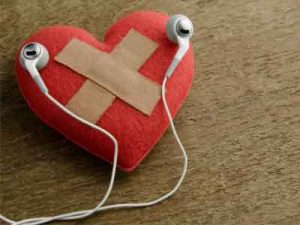Music in its true form is healing. Its something that touches our heart and acts as a soothing explosion of human expressions. Music speaks in emotions and once it is in our heart it resides their forever.
These words stir sugar in our ears and one might simply think of his or her favorite melody after reading the lines. But we are not going to talk about just music in this piece of writing. Getting to the shores of the much more purposeful topic, as we always have, we are going to discuss our health. And how music can improve our heart energy.
Why only music

You might wonder why out of all other approaches, music defines the best scenario of heart healing. Music can easily make you laugh or cry. It can rile you up and down, convert your sorrows into joys and motivate you at times. Music can help your curious hormones elevate and can even assist your body in grooving to the beats. Needless to say, it has to be good for heart tool. It might cure your arteries of a clot or blockage but can surely ease the recovery process. The cardiac procedure can get back to normal with good music. Music relieves stress and even help lower down a high blood pressure value.
Some history

Music is the true sound of healing. Ancient history proves this. The Chinese used medicinal characters for the music. Greek used music to remove stress, help reduce pain and even to induce sleep. What do you think lullabies and poems are made for? They help kids sleep with calmness. Even Africans and Native Americans sang and chanted during various healing rituals.
Some believe that the connection to music might have been low with the introduction of medicine of science. But, the connection came to life with music therapists literally demonstrating the value and effect of nodes for treating people. Some Alzheimer’s patients and chronic pain could easily be treated with music. Music effects are much more lucrative when it comes to the cardiovascular system. The effects include the change in blood pressure, normalizing of heart rate, better blood flow through arteries, increase in working efficiency and many more.
Music therapies for heart patients
Coming back to the point where the heart can take some perks of music,  here are the therapies nowadays effectual for patients. These days, medical technology is going more towards ancient and traditional ways of healing. Music is helping people recover from a heart attack. It also helps cope up with heart failure and some other cardiac diseases.
here are the therapies nowadays effectual for patients. These days, medical technology is going more towards ancient and traditional ways of healing. Music is helping people recover from a heart attack. It also helps cope up with heart failure and some other cardiac diseases.
Music during surgery

There are various healing enhancement programs that provide massage, relaxation, and music to patients facing heart problems. In such programs, doctors encourage patients to listen to melodies during, before or after the operation. Studies indicate that this type of music therapy eases our pain and anxiety. It also blocks out other demotivating sounds of the hospital. This facilitates a psychological boost for the patient. The team, besides providing medical facilities, also work on sounds that come from nature. This include chirping of birds, a rhythmic chore of leaves falling, wind blowing or sweet sounds of the flute or any other soothing instrument. This helps patients realize that they are not in the hospital but outside in the lap of nature. They get the feeling that the surgery or the operation id sone in an open natural space.
Music for recovery

Music is helping people show quick recovery signs in terms of cardiovascular problems. Be it a recovery path or a heart attack convalescence, music can help boost the process. People living with claudication or angina have reported great positive effects when subjected to music. The reason behind this is the fact that heart problems can be highly stressful. It can make patients feel as if their life is going to end soon. Music can help alleviate stress while providing a feeling of control over life.
Tests

various tests performed in this regard led to certain optimistic results. These have found that music therapy towards cardiac rehabilitation can cause better blood control pressure. This comes with better mental and general health. This is even more beneficial than rehab treatments. Music also improves our sleeping patterns. It can unwind a stressful body easily.
Various scientists use custom-built stethoscopes that identify the levitical activity of the heart. This helps to identify the musical rhythms of the heart’s electrical activity. The equipment then recognized normal and abnormal heart tones. For abnormal ones, doctors use counter-rhythm music that retrains the heart to become normal. The concept is the same as we can recognize whether the tune from an instrument is good or bad. This, when applied to the heartbeat, can help identify problems to be recovered by music tones.
Effects on regional heart activity
Emotions that evoked by music can help measure the regional activity of the heart. Various cardiac functions such as excitation, contractile force, coronary circulation, and conduction velocity are tested on the basis of amplitudes. The timing of electrocardiogram waves can also reveal the activity results. Normal regional heart activity modulates due to the activity of neurons in our cardiac nerve plexus. These neurons get influenced by emotion. And such emotions change due to several traits.
The first trait is the autonomic activity being transmitted into nerve plex of cardiac. This is done by parasympathetic and sympathetic nerve fibers of the heart. The second trait relates to emotions having an effect on hormones like adrenaline and angiotensin that are common circulating hormones in our heart. The third trait is based on the way blood pressure modulates according to our breathing frequency and depth of breathing. This as we know, is usually altered by our emotions as well.
More effects of music

The good thing about music is when it hits you, you feel no pain. Yes, music is good for us. But how does it affects us?
We often characterize our emotional states alterations with functioning or heart. Being excited resulting in high blood pressure and being sad resulting in low blood pressure are the classic instances. Music has the capability to change, alter or evoke emotions. It influences our heart in a safer way.
The effects of music can be differentiated on the basis of different physiology levels. These levels include heart variability, heart rate, breathing rate, breathing depth, and blood pressure. In healthy individuals, great music listening experiences result in increased blood pressure. If the music can raise the hair on the arms, the blood pressure attains a new level and our respiratory metabolism increases. Generally speaking, good music increases blood pressure while relaxing music lowers it down. This, in any case, is beneficial for our heart. Music touches our heart and reflects the individual emotional effects.






